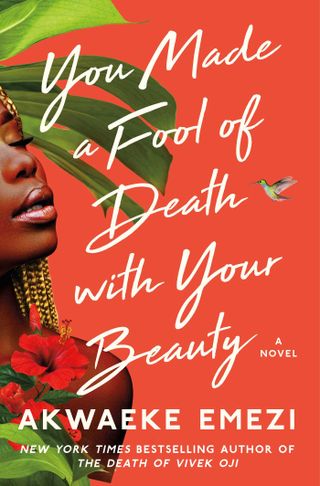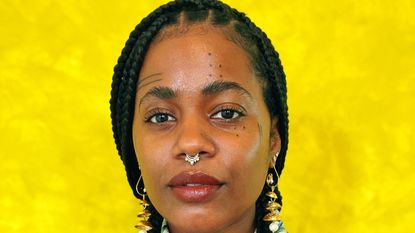
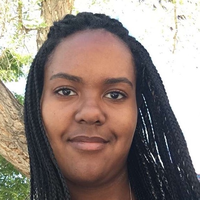
Akwaeke Emezi’s newest book You Made a Fool of Death With Your Beauty is not a typical romance novel. If you’ve ever read anything by Emezi—a wonderfully insightful, critically honest master of language—that's no surprise. What’s surprising is that Emezi, who grew up reading romance novels in Nigeria and uses they/them pronouns, did set out to write a typical romance, until their heroine Feyi led them down a different path.
Feyi, an artist recovering from grief following her husband’s death, is a messy protagonist. She goes through several romantic entanglements over the course of the book, and has to prioritize herself in those relationships. Emezi says the early reader responses have been wide-ranging, and bring up an interesting conversation about societal conventions on romantic love. “People have strong feelings about Feyi's choices and about how she talks, her profanity. Recently I've been seeing a lot of people saying they don't agree with her choices. It's just a fascinating conversation.”
While Feyi does end up finding her grand romance, Beauty is a love letter to Feyi herself, and her journey in learning to love and trust again while working through grief. Like Emezi’s other books, it follows the themes of people building unconventional lives and finding freedom outside of societal, physical, and bodily boundaries. It’s also an ode to all the messy, selfish, impulsive decisions that make a life, and the happiness that could be waiting if a person is willing to go for it.
Below, Emezi speaks with Marie Claire about their history with the romance genre, Feyi’s unexpected journey, and working on the Hollywood adaptation of Beauty.
Marie Claire: Could you talk a little about the development of the book and deciding to focus on Feyi dating as a way to go along with her journey, working through the grief from losing her husband?
Akwaeke Emezi: This wasn't a book that I started writing that turned out to be a romance novel. I very much wanted to write a romance, so her grief storyline was actually surprising to me. I wanted it to be a simple romance, but as a character, she ended up being more complex than I expected. Whenever my characters do that, I don't really have a choice except to follow them, because if I didn't, then the book would just be bad. In order to do the story justice, I follow wherever [the characters] take me, and that was where her grief and her connection through her visual arts came out, and then that tied into the romance itself. They became intertwined in a way.
MC: While reading the book, I was so surprised with the plot. I thought, “Okay, here's the love interest. Oh wait, no, she dumped him. Oh, here's the guy. Oh wait. Nope. It's this other person that I never expected.”
Stay In The Know
Marie Claire email subscribers get intel on fashion and beauty trends, hot-off-the-press celebrity news, and more. Sign up here.
AE: Someone on TikTok describes Feyi as being a "homie hopper," and I died laughing because I was like, yeah, fair enough. But the journey that you describe about this guy and this guy, I think it mirrors what it was like for her. Where she ends up is as unexpected to the reader as it was to Feyi. I did know that it was kind of departing from the way romances are traditionally written, where whoever she meets first is the love interest for the rest of the book. In this case, I knew that this work was subverting it not just once but twice. I really did consider trying to simplify it, but it just didn't work for her. Every step of her journey was important and I couldn't cut them out without damaging the development of her character.
MC: You've said before how you read everything as a child—including romance novels. Did you draw inspiration for many of them when you started working on the book?
AE: I've read hundreds of romance novels in my life and I genuinely do mean hundreds. In my teenage years we would smuggle Harlequin and Mills and Boone romances to each other in school because they were contraband. We weren't allowed to bring them to school or exchange them and we did this anyway.
When I came to the States, I discovered paranormal romance, and that was amazing because you can combine genres. You can have shape-shifters and all these other creatures and put them in romance. Then I think I took a break from romance for a bit, and in the last couple of years, I came back to the genre to find that it had evolved so much. There was such a wide range of books, and it was a delight to read romances that were about predominantly Black and brown people, that were inclusive, that were written by Black authors, that accounted for disabled people and neurodivergent people. When you use your stories to say that people like this are worthy of the kind of love romance novels are made of, this grand, transformative love, then those stories do something.
It also helped me realize that I could write a romance the way that I wanted to, and give myself the permission to write without trying to make it fit convention. The only thing that really mattered was that it has to have a Happily Ever After, because if it doesn't have a Happily Ever After, it is not a romance novel. That was pretty much the only criteria that I held myself to.
I wanted to write a story that wasn't neat, because I think so many relationships aren't.
MC: As for the island where Alim lives, I know you’ve previously spent some time in Trinidad, but the island in the book is never actually named.
AE: The island is just a fictional Caribbean island. I considered naming it. Honestly, I just never got around to it, but I wanted it to be a Caribbean island. I didn't want to be specific because I don't think I have enough lived experience to write a specific island faithfully. I try to avoid situations like that, because then the vibe of it and the dialects have to be accurate. I've had to do it with Pet and Bitter, my YA novels, because Bitter in those books is Trinidadian, and that meant all her dialogue had to be double-checked by a Trinidad person to make sure I wasn't messing it up. I just wanted to give myself a bit more leeway, so it's easier to just do fictional places. Then you can still keep the vibe accurate to the general location. It's very clear that it's a Caribbean island. You just don't know which one, because I made it up.
MC: There's this gorgeous passage late in the book about people being messy, and how being able to make a disaster and recover from it is one of the greatest parts of being human. That also reminded me of the Deity: Dear Eleghosa chapter of Dear Senthuran. That passage and that chapter really connected for me about what humans could become without fear and judgment, not only from the outside, but also from their own ideas of themselves.
AE: I really wanted You Made a Fool of Death with Your Beauty to be a messy book. I wanted to write a protagonist who still has a Happily Ever After even after being messy, because I think it's very interesting how people react to that. We have these ideas about who deserves a Happily Ever After and who deserves to get away with doing certain things. We really get to dive into the ethics of dating, and people's ethical lines about how far they will go to pursue love, or sometimes just to pursue pleasure. To be able to engage in these conversations and have feelings about what they have done, it's such a mark of being alive. I wanted to write a story that wasn't neat, because I think so many relationships aren't. There's gray areas and questions. Is this right, or is this wrong? There's this standard of walking through life making all the right decisions, and that's not how the world works. Sometimes people f--k other people over and still get a happy ending.
We have these ideas about who deserves a Happily Ever After and who deserves to get away with doing certain things.
MC: I also did want to talk about Amazon Studios’ forthcoming screen adaptation of the book, which you're actually serving as executive producer on. I'm very curious whether you wanted to be involved in the adaptation from the beginning, or did that opportunity come up during negotiations?
AE: It's very deliberate. I'm pretty hands on with all my adaptations, and I intend to continue being. The question at the beginning when we took out the film/TV rights was really whether I would write the script for the movie itself. That was what I had to decide, because you could say here are the rights, the author is already attached as the scriptwriter, and I actually decided not to write the script. It was a difficult decision, not because I wanted to write the script, but because writing for film and TV is considered such a desirable job for a lot of writers. And I get it. As a TV writer, you get amazing health insurance, and a lot of money. You can gain so much power by writing [the script] and being even more involved in it.
I think the main difference is that when writing for film and TV, you're very much at the mercy of your bosses. With books, you write them, then you give them to the editor, and you have veto power over everything because you're the author. It doesn't work that way in film and TV. Everything has to be approved, [and] if they don't like where you're going with the story, you're not gonna go further. That for me was very, very difficult because of the type of work I write. I like to have my freedom, [and] to be able to write it the way I want. I don't want the limitations of markets to be involved in the creative process. I have so much respect for the Black women [in TV] who are writing and creating their own work on their own terms, because I know how hard it is to jump through all the hoops and survive people trying to change your work and warp it into something that's more palatable to a white mainstream gaze. When I see women, who've been writing for ages and they finally get to make what they want, like Abbott Elementary with Quinta Brunson, or Nikyatu Jusu getting to make her feature film Nanny, which is based on African indigenous realities. I'm just like, yes! You made it through. Godspeed to you, cause I thought about it and I was like never mind, I can do this with books and it doesn't give me as much stress. I can just EP the projects and have a healthy distance that way.
The interview has been edited and condensed for clarity.

Quinci LeGardye is a Contributing Culture Editor who covers TV, movies, Korean entertainment, books, and pop culture. When she isn’t writing or checking Twitter, she’s probably watching the latest K-drama or giving a concert performance in her car.
-
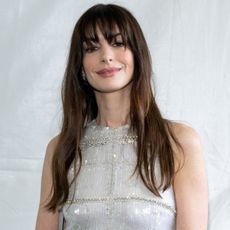 Anne Hathaway Details the "Gross" Audition Request She Once Endured
Anne Hathaway Details the "Gross" Audition Request She Once Endured"Now we know better."
By Meghan De Maria Published
-
 The Emotional Ending of 'Baby Reindeer,' Explained
The Emotional Ending of 'Baby Reindeer,' ExplainedNetflix's latest miniseries from Richard Gadd is based on the true story of the comedian and his stalker.
By Quinci LeGardye Published
-
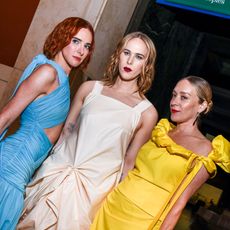 The Must-Visit Hair Colorists in New York City
The Must-Visit Hair Colorists in New York CityI trust these talented colorists implicitly.
By Sophia Vilensky Published
